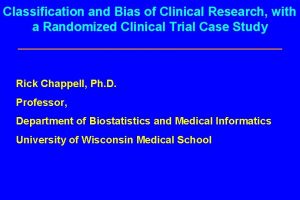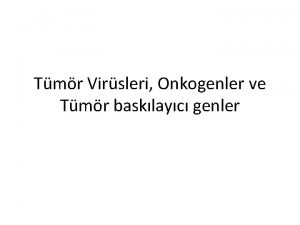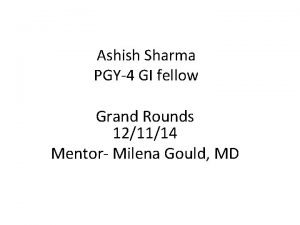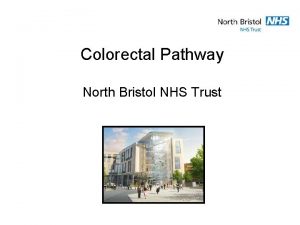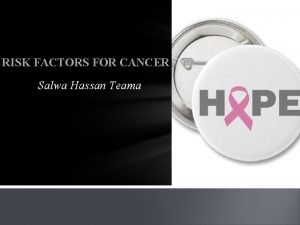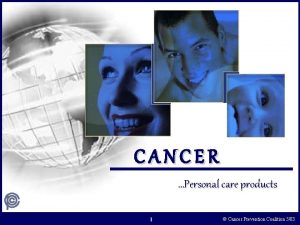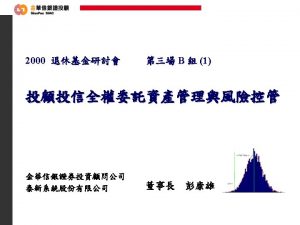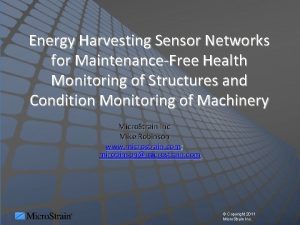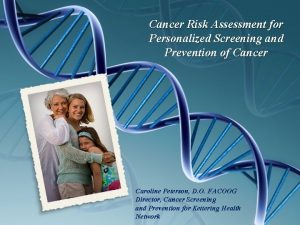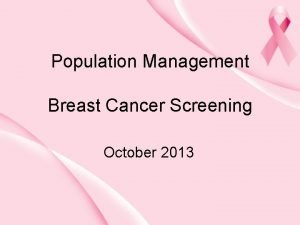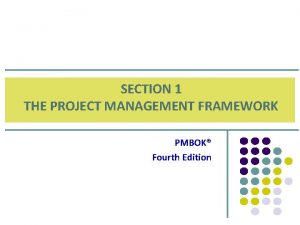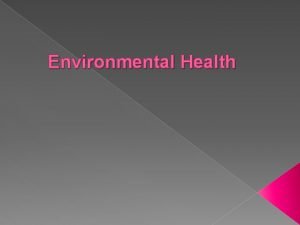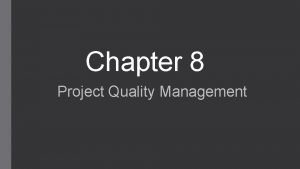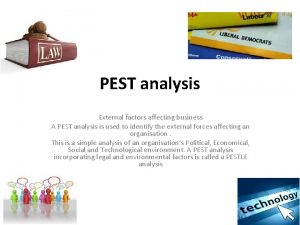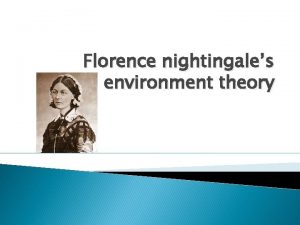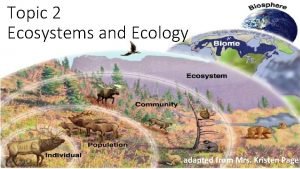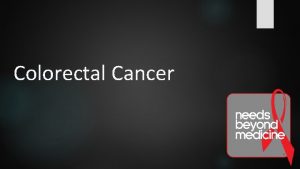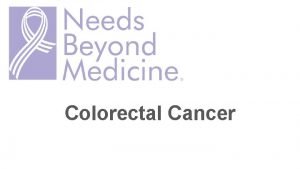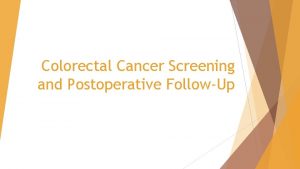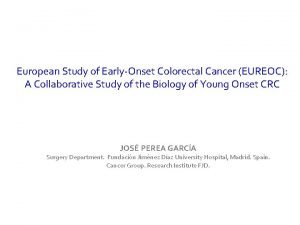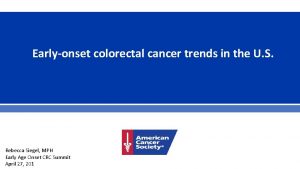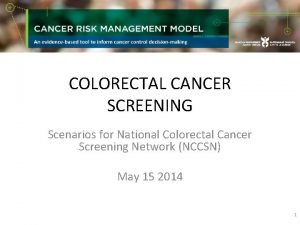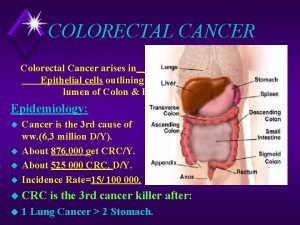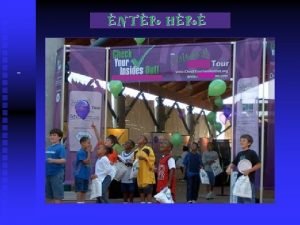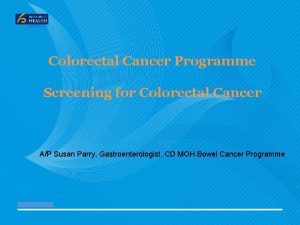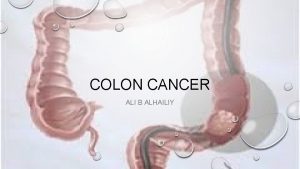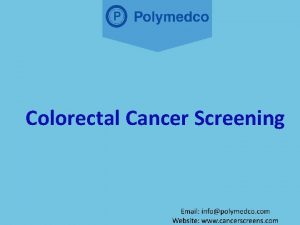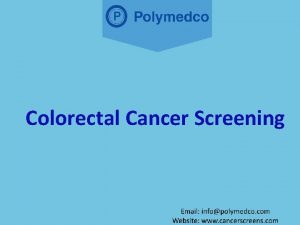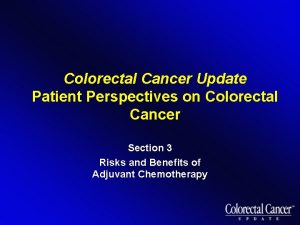Environmental Risk Factors and EarlyOnset Colorectal Cancer Risk


















- Slides: 18

Environmental Risk Factors and Early-Onset Colorectal Cancer Risk Aung Ko Win MBBS MPH Ph. D Senior Research Fellow National Health and Medical Research Council Early Career Fellow Centre for Epidemiology and Biostatistics Faculty of Medicine, Dentistry and Health Sciences Melbourne School of Population and Global Health The University of Melbourne Australia Presented at : Early Age Onset Colorectal Cancer Summit 2016, New York March 19, 2016.

Background • The development of CRC is complex, influenced by both genetic and environmental factors. • Only 10 -15% of early-onset CRCs is associated with known genetic risk factors for CRC. The remaining early-onset CRCs may be associated either with other (unknown) genetic factors or environmental factors. • Previous studies have shown a number of environmental risk factors associated with CRCs of all ages or late-onset CRCs. • Approximately 90% of CRCs are diagnosed >50 years. The observations of environmental risk factors from previous studies may not necessarily be applied to early-onset CRC.

Colon Cancer Family Registry

Colon Cancer Family Registry Cohort An International Resource for Studies of the Genetic Epidemiology of Colorectal Cancer funded by NIH: 1997 -2012 (now extended to 2017) Fred Hutchinson Cancer Research Center – Seattle PI. Polly Newcomb Recruitment: Puget Sound area University of Southern California consortium – LA PI. Robert Haile (Stanford University) Recruitment: Southern California, Colorado, Arizona, North Carolina, Minnesota, Dartmouth Medical School, Cleveland Clinic Cancer Care Ontario – Toronto PI. Steven Gallinger Recruitment: Ontario University of Hawaii - Honolulu PI. Loic Le Marchand Recruitment: Hawaii 13, 500 families 45, 000 individuals 1834 Lynch syndrome carriers 54 biallelic MUTYH carriers 385 monoallelic MUTYH carriers Mayo Clinic – Rochester PI. Noralane Lindor Recruitment: Mayo Clinic Australasian Colorectal Cancer Family Registry – Melbourne PI. Mark Jenkins Recruitment: Melbourne, Sydney, Brisbane, Perth, Adelaide, Auckland

Data Collection Ascertainment of families • Population-based: recruited first- and second degree relatives via probands (incident CRC cases from cancer registries) • Clinic-based: recruited all relatives via probands (first person of family visited to family cancer clinics) Data Collection • epidemiological data (medical history, demographic characteristics, reproductive history, physical activity, medication, hormone replacement therapy use, alcohol and tobacco use, and dietary factors) • detailed family history of cancer for relatives • a blood sample for mutation testing • any tumour tissue if affected

Eligibility Criteria for Cases and Controls Cases • Diagnosis of an invasive CRC at age 18 -49 years • No previous diagnosis of any cancer/polyp before CRC • Ascertained through population cancer registries Controls • Population Controls Randomly sampled from the general population aged <50 years living in the relevant recruitment area using electoral rolls (Australia), Medicare and Driver’s License files (Seattle), telephone subscribers lists (Ontario) No previous diagnosis of any cancer/polyp before recruitment • Spouse controls Spouse of eligible cases who had no pervious diagnosis of any cancer/polyp before recruitment, aged <50 years

Statistical Analysis • • Unconditional logistic regression Univariable and Multivariable analyses Stratified by sex and site of CRC All analyses were conducted using STATA 13. 0.

Characteristics of Cases and Controls

m tu ec 30% R d oi n lo co gm si to R ec d oi gm Si co e n lo xu r fle g in nd es ce D c ni le Sp co re n co lo um fle xu e er s sv an Tr ic at ep H ng di en sc A C ec Distribution of Early-Onset CRC 35% 67% 25% 20% 15% 10% 5% 0%

Personal Characteristics and Early-Onset CRC

Medication, Food intake and Early-Onset CRC

BMI and Early-Onset CRC

Alcohol consumption and Early-Onset CRC

Female reproductive factors and Early-Onset CRC

Summary Findings Family History of CRC Crohn’s / Ulcerative Colitis Beer Consumption Red Meat Intake High BMI Higher Education Aspirin / Ibuprofen Multivitamin supplement Calcium supplement Hormone Contraceptives

Conclusions • Environmental risk factors we observed to be associated with early-onset CRCs are similar to those for late-onset CRCs. • However, there might be other unmeasured environmental risk factors associated with earlyonset CRCs.

Acknowledgement Funding • Colon Cancer Challenge Foundation • NHMRC Fellowship • Bowel Cancer Australia The University of Melbourne • Mark Jenkins • John Hopper • Daniel Buchanan • Mark Clendenning • Ghazaleh Dashti • Sergio Taunde University of Queensland • Christophe Rosty Royal Melbourne Hospital • Finlay Macrae • Ingrid Winship Cancer Council Victoria • Graham Giles University of Adelaide • Joanne Young Stanford University • Robert Haile University of Southern California • Graham Casey University of Hawaii • Loïc Le Marchand Mayo Clinic • Noralane Lindor • Stephen Thibodeau Fred Hutchinson Cancer Research Center • Polly Newcomb • John Potter University of Toronto • Steven Gallinger University of Colorado • Dennis Ahnen University of North Carolina • John Baron State University of New York • Thomas Weber

© Copyright The University of Melbourne 2009
 Colorectal cancer drug trial
Colorectal cancer drug trial Sorunun cevabını bul
Sorunun cevabını bul Amsterdam criteria
Amsterdam criteria Risk factors of head and neck cancer
Risk factors of head and neck cancer Ann lyons colorectal surgeon
Ann lyons colorectal surgeon Md frcpc definition
Md frcpc definition Risk factors of cancer
Risk factors of cancer Personal care products and cancer risk
Personal care products and cancer risk Liquidity measures
Liquidity measures Wireless health
Wireless health Claus breast cancer risk calculator
Claus breast cancer risk calculator Breast cancer risk
Breast cancer risk Lifetime risk of lung cancer
Lifetime risk of lung cancer Project management framework pmbok
Project management framework pmbok Define environment health
Define environment health Organizational process assets
Organizational process assets Tesco political factors
Tesco political factors Chattering hopes
Chattering hopes Biotic factors
Biotic factors
